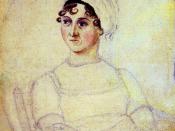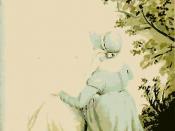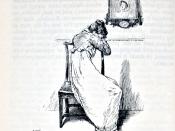The Irony of Social Status through Marriage
Since the beginning of mankind, all societies throughout history have been structured unequally. Naturally, wealthier individuals reside high up on the social ladder, and peasants and slaves on the bottom. Society says that where you are born, or whom you are born to, affects an individual for their whole life. In Jane Austen's novel Emma, the realities of social hierarchy and social mobility are challenged through various forms of narrative. Austen creates a network of relationships throughout the community of Highbury through seemingly unimportant conversations to explicit declarations of feelings with her use of free indirect discourse. The novel revolves around the main character, Emma and her misunderstandings of status and the hierarchy. Austen's clever use of dramatic irony and characterization of Emma as a model and perpetuator of the social system enables the reader to view the immobility of the class structure through her interactions with Harriet, Mr.
Elton, and Mr. Knightley, while Emma herself is unaware of her role in perpetuating this system.
The first relationship that provides insight into the limitations imposed upon refined young ladies in terms of broadening their social circles is the friendship between Emma and Harriet. Emma serves the role of a mentor or superior. She aims to improve Harriet's station in life by providing her with the opportunity to "marry up." Because of the mental constraints that prevent Emma from seeing Harriet as a true equal, she is never able to take her seriously as friend material, as much as her emotions might lead her in that direction. When first introduced, Emma was not particularly interested by Harriet herself, but saw wasted potential. Seeing Mr. Martin as mediocre and unworthy of Harriet, Emma concludes that Harriet needs her help:
"She would notice her; she...


